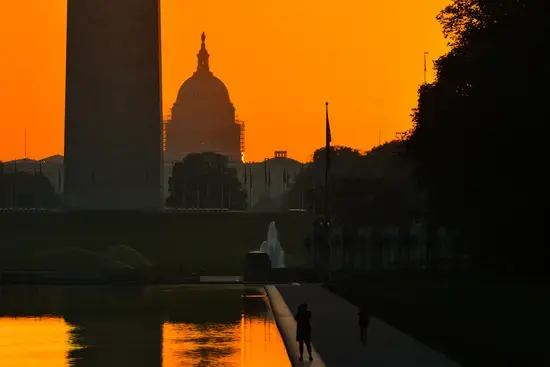This letter features reporting from “Summer Heat Can Lead to Adverse Health Restrictions for Residents Across D.C.” by multiple journalist-grantees from Hola Cultura, a Pulitzer Center reporting project
Dear Congressman McClintock,
In my health class, I could hear the throats of my friends struggle for air.
As severe asthmatics, their bodies couldn’t handle the polluted air from the California fires raging 200 miles away. This wasn’t the first time, and it won’t be the last. This is the new norm, what my generation and future generations are burdened with. In California, fire season is known as a time of catastrophe. One wrong move can cost thousands of lives and taxpayer dollars. And some 2288 miles away, Washington, D.C. is facing a similar problem. An article titled “Summer Heat Can Lead to Adverse Health Restrictions for Residents Across D.C.,” written by multiple grantees from Hola Cultura as a project on D.C.’s “heat islands,” examines the impact of heat on residents.
The article reveals a sinister truth: lower-income neighborhoods are at higher risk. These urban areas are more likely to have a high density of people, creating a shortage of tree cover. And according to the article, historically Black neighborhoods in D.C. suffer from diverted investments into their communities, creating generational socio-economic issues that lead to poverty and a lack of access to healthcare. As the authors state, “Summertime heat waves do not treat all D.C residents equally.” These neighborhoods are directly on the path of heatstroke and heat illness when summertime rolls around. Heat has long-term effects, such as complicating pregnancies and reducing the effectiveness of medication. These people have been stuck in an environment that is slowly killing them, with no way out.
The effects of extreme heat in California parallel what’s happening in D.C’s heat islands; lower-income neighborhoods, not just in the U.S, but around the world, can feel climate change. According to NASA, the Earth will continue to get warmer as human activities increase the concentration of “greenhouse gases,” gases that block heat from escaping our atmosphere. NASA goes on to say that the burning of fossil fuels is the primary contributor to this dilemma. And in the U.S., 79% of the energy produced in 2020 was from fossil fuels, according to the U.S. Energy Information Administration. Spreading awareness is only the first phase of action for real change.
Congressman McClintock, I ask you to go beyond spreading awareness. Reducing California’s fossil fuel emissions is an important factor in reducing the total U.S fossil fuel emissions. This can be done by creating legislation to push for renewable energy initiatives, such as implementing stricter laws for emissions standards of mobile vehicles or requiring renewable fuel for those vehicles instead of petroleum fuel. Advocating for organizations that promote a greener future can help them get the funding and the publicity they need to expand their work.
We also need to advocate for the lower-income neighborhoods that are most likely to be affected by climate change. Where I live, homelessness is slowly increasing. I urge the government to contribute more of its funds to heat prevention, housing, and water distribution programs to combat the effects of heat. To start, collecting information on the hottest places in lower-income communities can help relocate residents who are in danger from those areas. Provide these “hot spots” with tree cover and cooling technology as simple as air conditioners.
Small businesses and people whose work is mainly outdoors can be compensated when it simply becomes too hot to be outside, which is a part of the Heat Illness Prevention Program from the Occupational Safety and Health Administration (OSHA). Expanding this program can allow more measures to protect workers who are and will be exposed to extreme heat. And as for water; California residents have already felt the effects of a long-lasting drought. Public campaigns and funding can help workers and communities have access to safe drinking water in both public and private spaces.
The article from Hola Cultura serves as a reminder of what is happening now and what will happen in the future if we fail to take action. Your generation may die of old age, but mine will die with climate change. The recent COP26 Climate Summit is a starting point, but the people deserve the assurance that change is happening. No more empty promises. We must see change with our own eyes; we must be a part of it.
Be that change for the world. We will stand with you.
Sincerely,
Stephanie Olvido

Stephanie Olvido (she/her) is a freshman at St. Francis Catholic High School in Sacramento, California. She is learning how to express her voice through writing and art. She runs a blog, the Incognito Press, that focuses on uplifting the arts communities and spreading awareness about social issues and problems like climate change. She is very thankful for the platform she has been given to continue discussions about climate change. If Stephanie's not writing, she's either late to her taekwondo class, playing piano, or spending time with her family and friends.
Read more winning entries from the 2021 Local Letters for Global Change contest!
